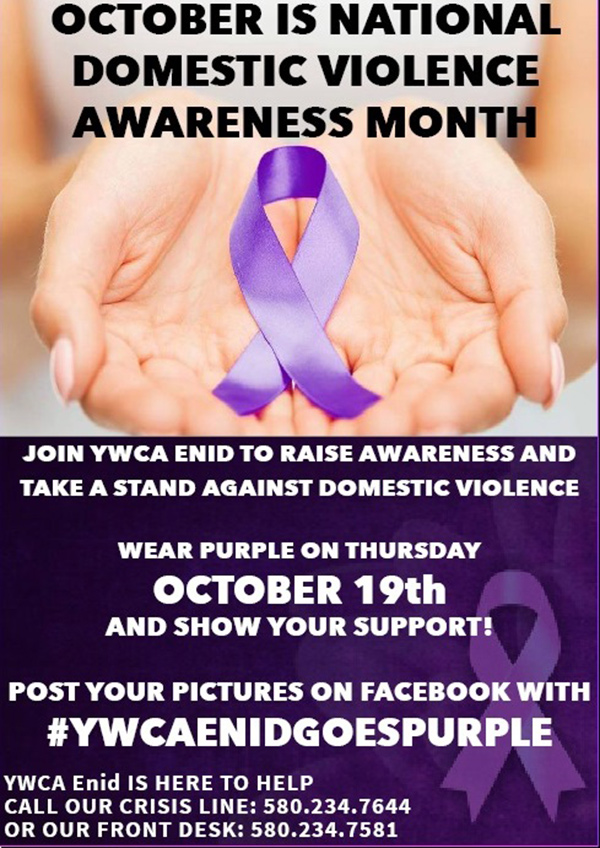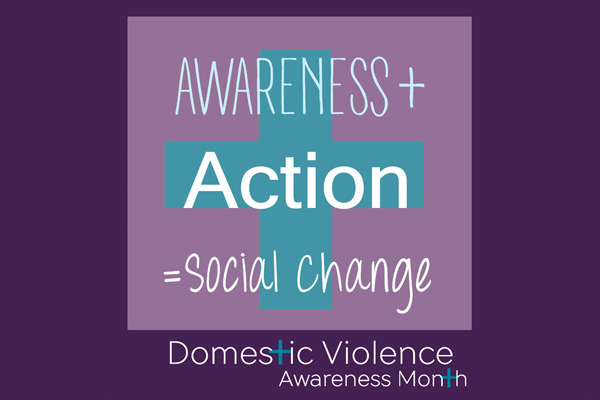Enid, OK - October is here and the YWCA is on a mission to educate the community about something that not many people talk about: Domestic Violence. Not only is Oklahoma ranked 6th in the nation for the number of women killed by men, but it is also ranked 1st in the nation for the lifetime prevalence of rape, physical violence, and stalking against women. Since October is Domestic Violence Month, the YWCA would like to bring awareness to the fact that domestic violence is prevalent in all communities and with more education and understanding, we can all help identify when domestic violence is taking place and how we can help those in need.
-
Starting October 16th and continuing on through the 20th, the YWCA will be promoting their Week Without Violence movement. This is a global movement to end violence against women and girls. Join them as they hold events, share information and stories, advocate, and more with a common goal in mind: "together, we can end gender-based violence". To find out more about the Week Without Violence, got to www.ywcaweekwithoutviolence.org
-
On October 19th, the YWCA will be hosting the Wear Purple Day. You can show your support to end Domestic Violence by wearing purple. It's a great opportunity to have your place of employment or school go purple! Make sure you take a picture of you and your friends wearing a purple shirt on that day and use #YWCAEnidGoesPurple.
-
What is domestic violence? Domestic Violence is the willful intimidation, physical assault, battery, sexual assault, and/or other abusive behavior as part of a systematic pattern of power and control perpetrated by one intimate partner against another. It includes physical violence, sexual violence, threats, stalking, and emotional abuse. The frequency and severity can vary dramatically.
-
Warning signs of domestic violence:
- Extreme jealousy
- Possessiveness
- Unpredictability
- A bad temper
- Cruelty to animals
- Verbal abuse
- Extremely controlling behavior
- Antiquated beliefs about roles of women and men in relationships
- Forced sex or disregard of their partner's unwillingness to have sex
- Sabotage of birth control methods or refusal to honor agreed upon methods
- Blaming the victim for anything bad that happens
- Sabotage or obstruction of the victim's ability to work or attend school
- Controls all the finances
- Abuse of other family members, children or pets
- Accusations of the victim flirting with others or having an affair
- Control of what the victim wears and how they act
- Demeaning the victim either privately or publicly
- Embarrassment or humiliation of the victim in front of others
- Harassment of the victim at work
-
Facts:
Every 9 seconds in the US a women is assaulted or beaten
Domestic violence is the leading cause of injuring to women - more than car accidents, muggings, and rapes combined
Studies suggest that up to 10 million children witness some form of domestic violence annually.
Every day in the US, more than 3 women are murdered by their husbands or boyfriends.
*Please note that domestic violence is not limited to women. Men are also victims of domestic violence, however studies are just now in the process and facts have not been shown yet.
-
Why does the victim stay? When it is a viable option, it is best for victims to do what they can to escape their abusers. However, this is not the case in all situations. Abusers repeatedly go to extremes to prevent the victim from leaving. In fact, leaving an abuser is the most dangerous time for a victim of domestic violence. One study found in interviews with men who have killed their wives that either threats of separation by their partner or actual separations were most often the precipitating events that lead to the murder.
-
What you can do to help or if you need help:
The YWCA is a safe haven for victims and they are there for support and a resource if an individual, or someone they know, is in a domestic violence situation. The center is staffed 24-hours a day, 7 days a week, 365 days a year by highly-trained, qualified, and caring staff. You can also call the 24-hour hotline at 800-966-7644 for help. The YWCA also offers free counseling to adults and children who are survivors of domestic violence or other traumatic events.
-
The YWCA helps victims of all genders, races, and ethnicity. If you are in need of help, do not hesitate to call the YWCA today!
-

-

-







